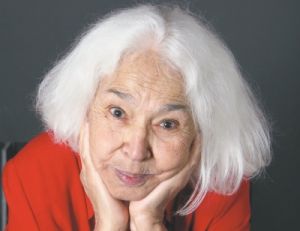STOCKHOLM-(AFP) – Stockholm’s literary circles are abuzz with speculation about this year’s

and while it’s notoriously difficult to predict the laureate, some experts are saying it’s time for a woman.
Among the women whose names are making the rounds ahead of the Swedish Academy’s announcement on Thursday are Canadian short story writer Alice Munro, Canadian poet Anne Carson, and Egyptian feminist novelist Nawal el Saadawi.
Yet others say it could be time for an American to win it, with novelists Don DeLillo, Philip Roth and N.Scott Momaday, a Native American, mentioned as possible laureates.
“You can never know or guess how the Academy is thinking,” Lina Kalmteg, a literary critic for Swedish daily Svenska Dagbladet, told AFP.
Only 12 of the 108 Nobel Literature Prizes handed out since the start in 1901 have gone to women.
The Swedish Academy may be attempting to correct the imbalance. There have been three women laureates in the past decade — Germany’s Herta Mueller, Britain’s Doris Lessing, and Austria’s Elfriede Jelinek — even though the Academy insists gender, nationality and language are not considered when making its choice.
“I can only guess and speculate, it’s fun and incredibly exciting,” said Elisabeth Grate, whose eponymous publishing house published the 2008 laureate Jean-Marie Gustave Le Clezio in Sweden.
“One could imagine that it could go to an author from North America, perhaps a man like Don DeLillo or Philip Roth,” she told AFP. But, she added, “it would be nice with a woman.”
Kalmteg said meanwhile she was pretty sure the prize would not go to a poet, after the honour went to Swedish poet Tomas Transtroemer last year.
“I think it’s always time for a woman, there are too few women laureates,” said Susanna Romanus of the Norstedts publishing house.
“Since there are so few women who have won the prize, the male dominance among the laureates could be seen as political, in the same way that very few writers from non-European cultures and languages have won the prize,” added Bengt Soederhaell, the head of the Stig Dagerman Society.
Named after one of Sweden’s most famous writers from the 1940s, the organisation each year hands out its own prize and twice in the past eight years its winners have gone on to win the Nobel Literature Prize a few months later: Jelinek in 2004 and Le Clezio in 2008.
This year it gave the prize to Nawal el Saadawi. Could she be the Swedish Academy’s choice for 2012?
“It’s possible, it would tie in well with the developments in the Arab world and she’s a woman,” Grate mused.
The Nobel is awarded for a writer’s body of work. British author Rudyard Kipling was just 41 when he won the prize and Albert Camus of France was 44, making them among the youngest Nobel Literature Prize laureates.
If “the laureate were under the age of 40, that would be astonishing,” Grate said, a thought echoed by Kalmteg.
“It’s very unlikely it would go to someone around 40. You need time to prove yourself,” she said.
“The names (of young writers) surface in the speculation, like Nina Bouraoui but she’s a bit young,” she added.
Among the gambling crowd, China’s Mo Yan and Japan’s Haruki Murakami top the list of favourites on online betting sites but their names fail to excite the experts.
“Murakami is one of those who is going to win the Nobel Prize (eventually). That would be nice … but if you’re looking to honour someone who has taken writing in a new direction I would prefer to see (Somalia’s) Nuruddin Farah win the prize,” said Soederhaell.
The Swedish Academy’s annual lists of Nobel Prize nominees and deliberations are kept secret for 50 years after the prize is announced.
The prize committee has been known to go to great lengths to keep the lid on its discussions, using fake book covers when reading in public and referring to authors by codenames.

